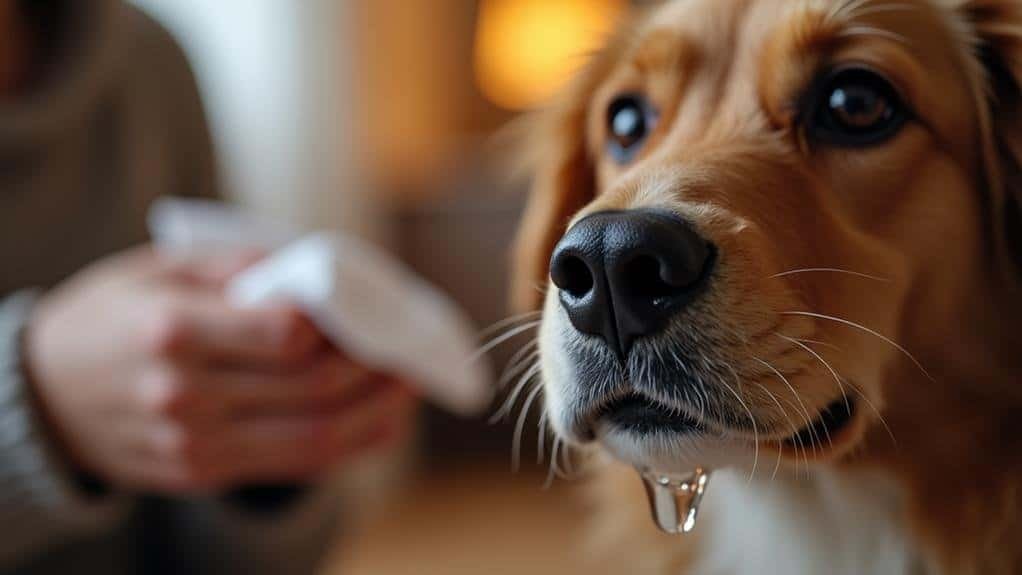Your dog’s runny nose can stem from various causes, ranging from minor irritants to more serious health issues.
Common culprits include allergies, infections, foreign objects, or even breed-specific traits.
Allergies often result in clear discharge, while infections might produce thicker, colored mucus.
If your pup’s nose is running for more than a few days, or if you notice other symptoms like difficulty breathing or lethargy, it’s time to consult your vet.
In many cases, simple home remedies and environmental changes can help manage a runny nose.
However, understanding the underlying cause is essential for proper treatment and prevention of future issues.
Common Causes of Nasal Discharge
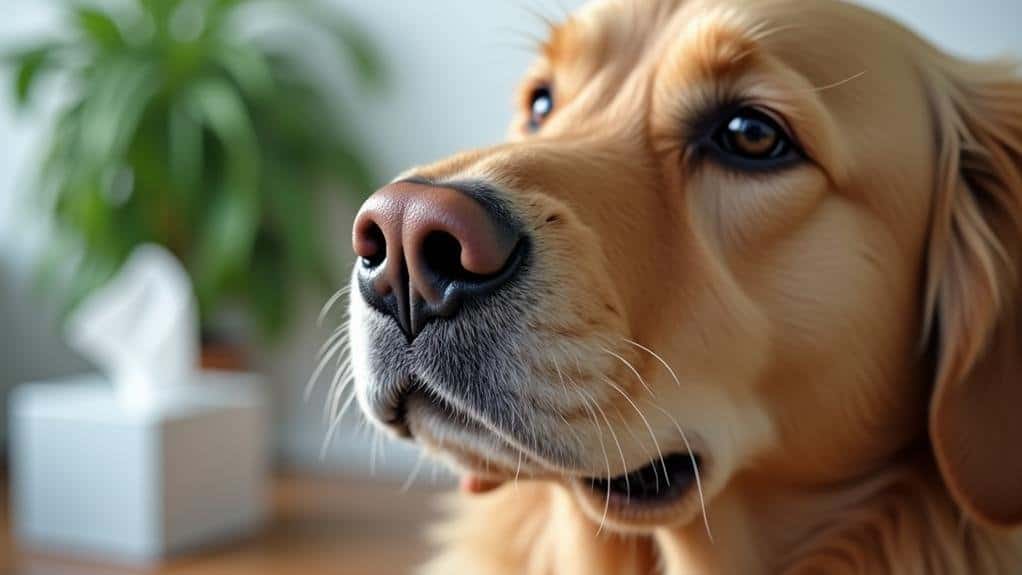
From time to time, you might notice your dog’s nose running. This runny nose in dogs, also known as nasal discharge, can be caused by several common factors.
Let’s explore the top reasons why your furry friend might be experiencing this issue:
- Allergies: Just like humans, dogs can suffer from allergies. Environmental triggers like pollen, dust, or dander can lead to clear discharge, sneezing, and itchiness.
- Infections: Bacterial, viral, or fungal infections can cause mucus or pus-like discharge. These often require veterinary care and may need treatment with antibiotics or antifungal medications.
- Foreign objects: If your pup has something stuck in their nose, you might notice discharge from just one nostril, along with sneezing and pawing at the nose.
- Nasal tumors or polyps: These can result in bloody or mucus-like discharge, often accompanied by noisy breathing and decreased appetite.
- Breed-specific issues: Flat-faced breeds like pugs and bulldogs are prone to chronic nasal discharge due to their unique anatomy.
If you’re concerned about your dog’s runny nose, it’s always best to consult with your vet for proper diagnosis and treatment options.
Allergies and Environmental Triggers
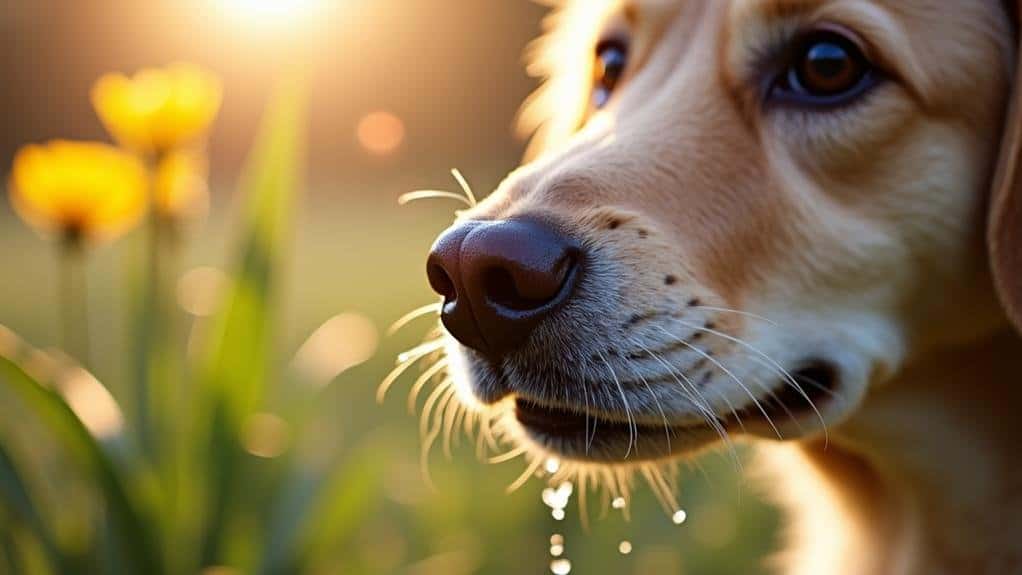
Your dog’s sensitive nose can react strongly to various environmental triggers, leading to allergies and nasal discharge. Common culprits include pollen, dust mites, mold, and dander, which can cause sneezing and a runny nose in your furry friend.
If you notice these symptoms, it’s crucial to reflect on the timing and frequency of the nasal discharge. Seasonal allergies typically result in clear discharge and occur during specific times of the year. On the other hand, year-round allergies may cause more persistent symptoms throughout the seasons.
It’s worth noting that some dog breeds, like pugs and boxers, are more prone to allergies and may experience increased nasal discharge during allergy seasons.
Environmental irritants can also play a role in your dog’s runny nose. Smoke, strong perfumes, and cleaning products can irritate their nasal passages, leading to increased discharge.
To help manage your dog’s allergy symptoms, contemplate these steps:
- Identify and minimize exposure to triggers
- Keep your home clean and free of allergens
- Consult your veterinarian about antihistamines or other treatments
Infections and Inflammatory Conditions
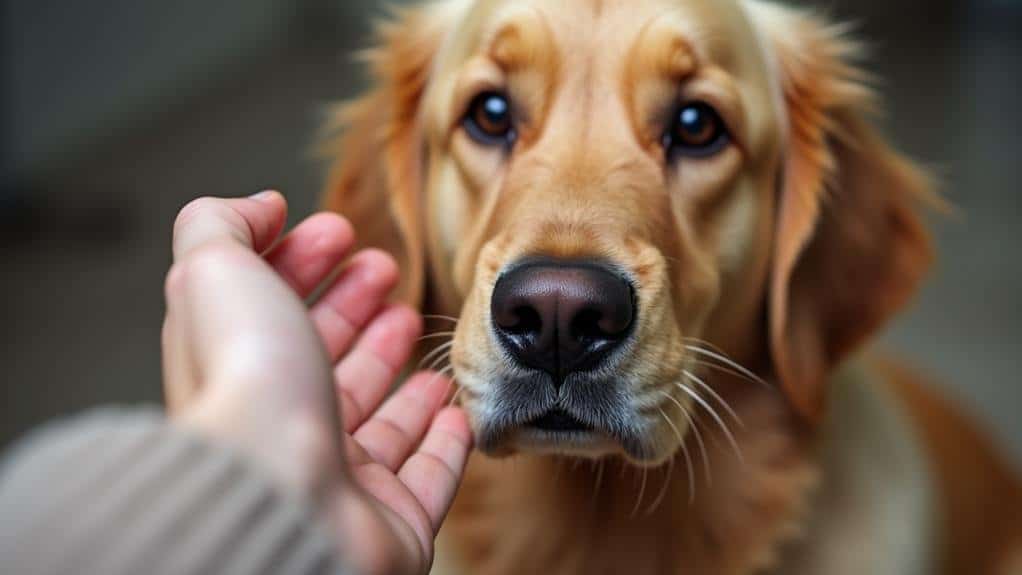
Beyond allergies, infections and inflammatory conditions can be significant culprits behind your dog’s runny nose. These issues often require veterinary diagnosis and treatment to resolve effectively.
Let’s explore some common causes:
- Infections:
- Canine distemper
- Kennel cough
- Nasal mites
These nasty culprits can lead to excessive nasal discharge, often accompanied by other symptoms like coughing, sneezing, and sometimes even bloody discharge. If you notice any of these signs, it’s time to call your vet!
2. Inflammatory Conditions:
- Rhinitis (nasal infection)
- Sinusitis
These conditions can cause your pup’s nasal passages to become inflamed and produce more mucus than usual. They’re often triggered by environmental irritants, infections, or allergies.
Bacterial and viral infections are common causes of nasal inflammation. Your vet might prescribe antibiotics or antiviral medications, depending on the underlying cause.
In some cases, chronic inflammation can lead to recurrent issues, requiring long-term management or even surgery. Remember, a runny nose might seem minor, but it could be a sign of something more serious. When in doubt, always consult your trusted veterinarian!
Breed-Specific Nose Issues
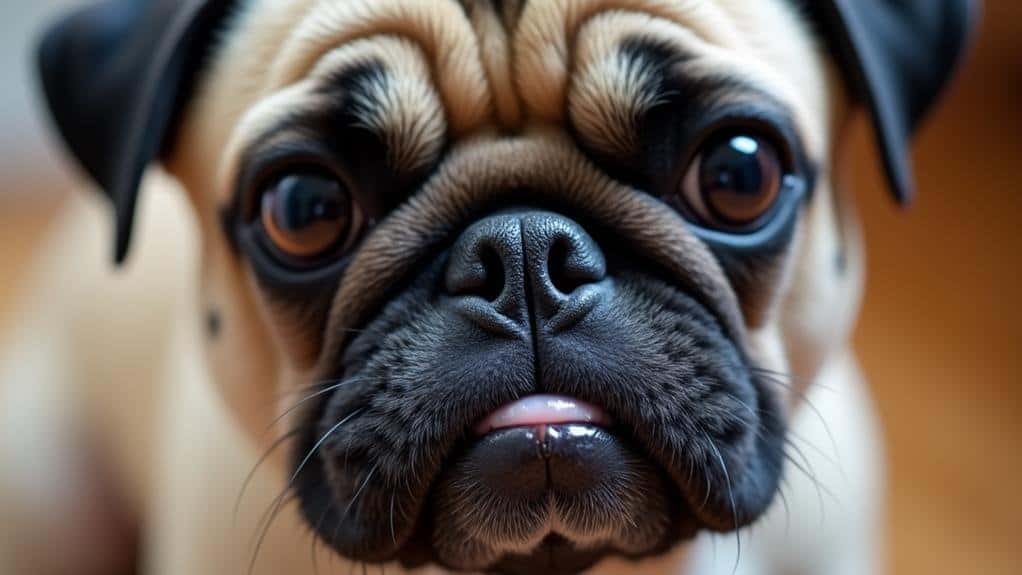
A dog’s breed can greatly influence its susceptibility to nasal issues. If you’ve noticed your furry friend has a runny nose, it might be due to their specific breed characteristics.
Let’s explore some breed-specific nose issues:
1. Flat-faced breeds:
Pugs and English bulldogs are more prone to chronic nasal discharge due to their unique facial structure. Their shortened snouts can lead to breathing difficulties and increased mucus production, making them more susceptible to runny noses.
2. Hunting breeds:
If you own a beagle or retriever, you may notice more frequent nasal discharge. These breeds spend a lot of time with their noses close to the ground, exposing them to environmental irritants like grass, dirt, and allergens.
3. Tumor-prone breeds:
Dalmatians and Boxers have a higher genetic predisposition to nasal tumors, which can cause discharge or bleeding from the nose.
4. Small breeds:
Chihuahuas may experience reverse sneezing, often triggered by allergies or irritants. This can sometimes be mistaken for nasal discharge.
5. Long-nosed breeds:
Greyhounds, with their elongated nasal passages, tend to have fewer nasal health issues compared to shorter-nosed breeds.
Understanding these breed-specific tendencies can help you better monitor your dog’s nasal health and address any concerns promptly.
When to Seek Veterinary Care
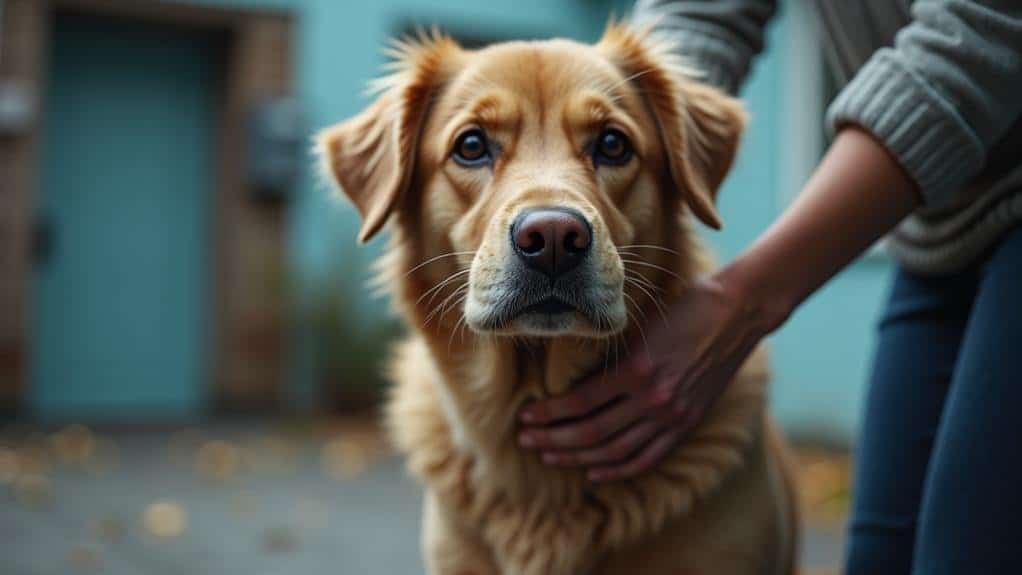
While understanding breed-specific nose issues is helpful, it’s equally important to know when a runny nose warrants professional attention.
As a pet owner, you should keep a close eye on your furry friend’s nasal discharge and overall behavior.
If your dog’s runny nose persists for more than a few days, it’s time to seek veterinary care, as this could indicate an underlying health issue that needs proper diagnosis and treatment.
Don’t wait to call your vet if you notice:
- Thick, colored, or bloody discharge
- Additional symptoms like difficulty breathing, persistent coughing, or lethargy
- Recent exposure to sick animals or potentially infectious environments
Remember, puppies and senior dogs are more susceptible to health issues, so any signs of a runny nose in these age groups should prompt a quick trip to the vet.
Your furry friend can’t tell you what’s wrong, so it’s up to you to be their advocate!
Home Remedies for Runny Noses

For mild cases of runny noses in dogs, several home remedies can provide relief and comfort. If your furry friend is dealing with nasal discharge, try these simple techniques to help them feel better:
1. Clear the Air
Keep your dog’s environment smoke-free and avoid strong scents. This can help reduce irritation and minimize runny noses caused by allergies or sensitivity to odors.
2. Gentle Cleaning
Use a clean, warm, moist washcloth to wipe your dog’s nostrils daily. This simple act can help maintain cleanliness and comfort, especially if there’s a buildup of discharge.
3. Steam Therapy
Let your pup benefit from the steam of a hot shower (without putting them in it). This can help clear their airways and provide relief from congestion.
4. Humidify the Space
Consider using a cool mist humidifier in your dog’s living area. It can help alleviate nasal discomfort, but be careful to avoid any electrical hazards.
5. Hydration and Nutrition
Ensure your dog stays well-hydrated and receives a balanced diet. Proper hydration and nutrition support overall health and can aid in recovery from nasal issues.
Preventing Nasal Problems in Dogs
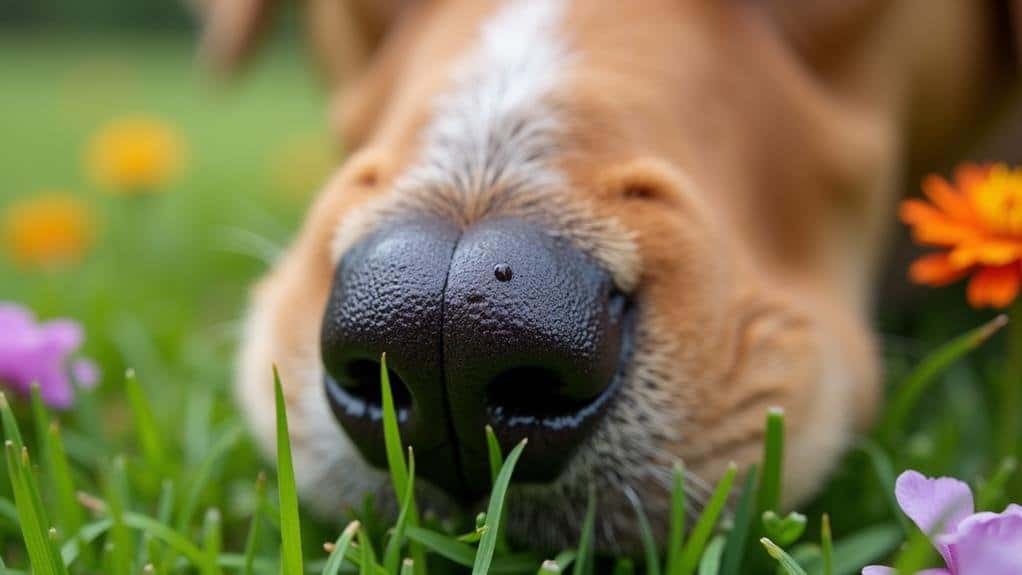
Now that we’ve explored home remedies, let’s focus on preventing nasal problems in dogs altogether. Keeping your furry friend’s nose healthy is easier than you might think, and it all starts with regular veterinary check-ups.
These visits can catch potential issues before they become serious, saving you and your pup from unnecessary discomfort.
Here are some key steps to prevent nasal problems in dogs:
- Create a clean living environment: Minimize dust, smoke, and strong odors to reduce nasal irritations and allergies.
- Stay up-to-date on vaccinations: Protect your pooch from infections like canine distemper and kennel cough, which can cause nasal discharge.
- Implement an allergy management plan: Work with your vet to identify allergens and use appropriate treatments, like antihistamines, to minimize allergy-related nasal symptoms.
- Maintain dental hygiene: Regular cleanings and check-ups can prevent dental issues that might contribute to nasal problems.
Frequently Asked Questions
Is It Normal for a Dog to Have a Runny Nose?
It’s not uncommon for dogs to have occasional runny noses. However, if it persists or is accompanied by other symptoms, you should be concerned. Monitor your dog’s behavior and consult a vet if the issue doesn’t resolve quickly.
Why Does My Dog’s Nose Drip Clear Liquid?
Your dog’s nose might drip clear liquid due to allergies, foreign objects, or infections. It’s common in flat-faced breeds. If it persists, check for other symptoms like sneezing or itching, and consult your vet for proper diagnosis.
How to Cure a Dog’s Runny Nose?
To cure your dog’s runny nose, you’ll need to identify the cause first. Consult a vet for proper diagnosis and treatment. You can use antihistamines for allergies, keep your pup hydrated, and clean their environment to reduce irritants.
Why Does My Dog’s Nose Look Like It’s Running?
Your dog’s nose may appear to be running due to allergies, infections, or irritants in the environment. It could also be caused by their breed, foreign objects, dental issues, or nasal tumors. Monitor the discharge and any accompanying symptoms.
Conclusion
Your dog’s runny nose can be caused by various factors, from simple allergies to more serious infections. Remember, you know your pup best, so trust your instincts if something seems off. While many cases can be managed at home, don’t hesitate to consult your vet if symptoms persist or worsen. By understanding the causes and taking preventive measures, you’ll be better equipped to keep your furry friend’s nose in tip-top shape. After all, a happy nose means a happy dog!

